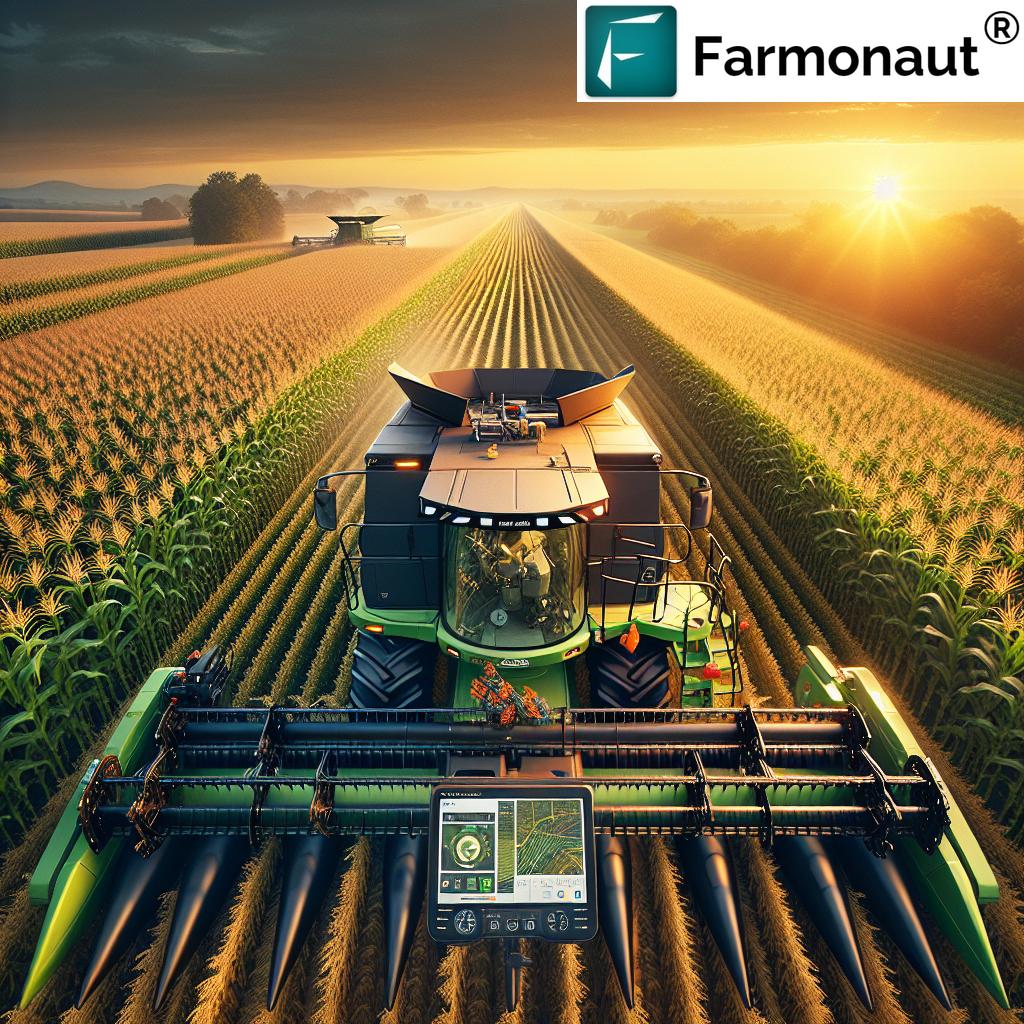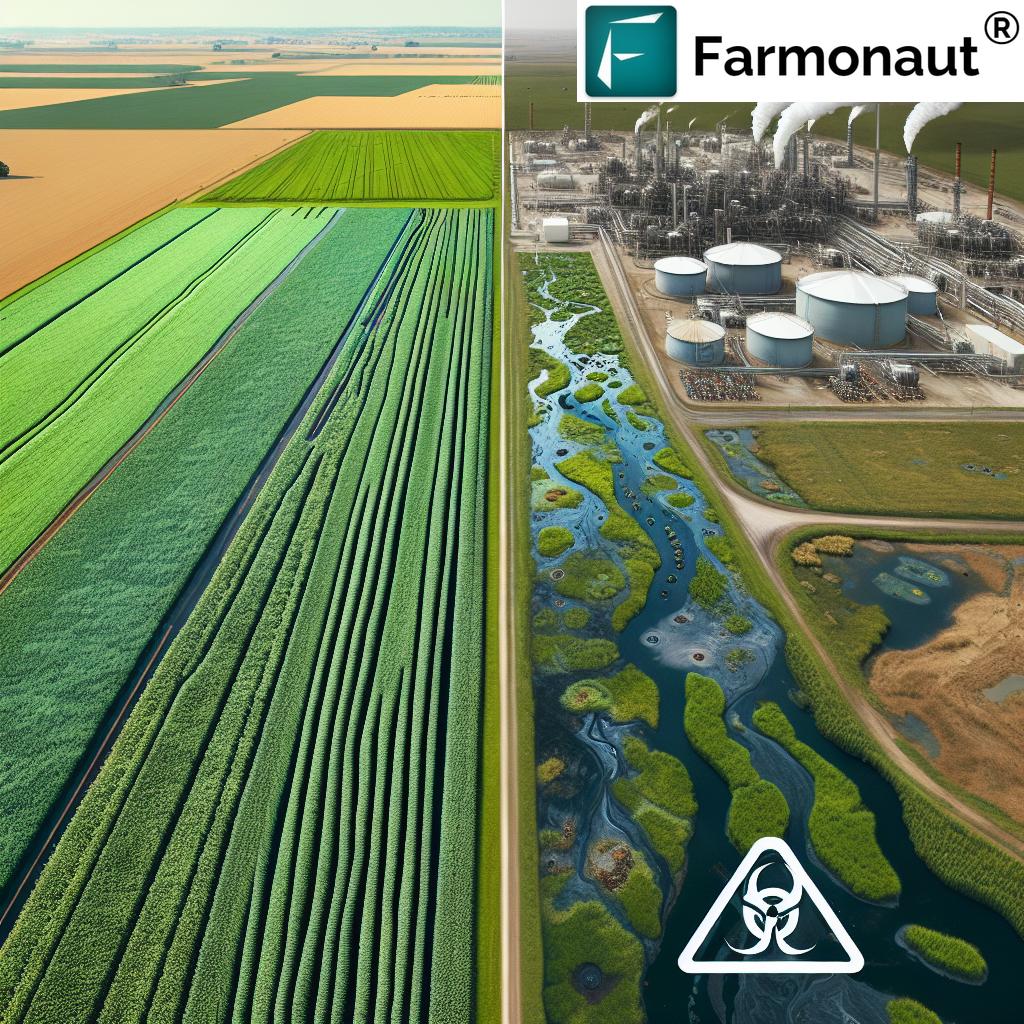Revolutionizing North Carolina Farming: Precision Agriculture Technology Trends for Maximizing Crop Yields
“Precision agriculture technology can increase crop yields by up to 30% while reducing water usage by 20-50%.”
Welcome to our comprehensive guide on revolutionizing farming practices in North Carolina through precision agriculture technology. As we delve into the latest innovations transforming the agricultural landscape, we’ll explore how these advancements are maximizing crop yields and shaping the future of farming in the Tar Heel State.

The Rise of Precision Agriculture in North Carolina
North Carolina’s agricultural sector is a cornerstone of the state’s economy, contributing significantly to its growth and employment. With the advent of precision agriculture technology, we’re witnessing a transformation in how farms operate, leading to increased efficiency and productivity.
- GPS-guided tractors and machinery
- Drone-based crop monitoring
- Soil sensors and smart irrigation systems
- Variable rate technology for precise input application
These technologies are not just buzzwords; they’re revolutionizing the way we approach farming in North Carolina. Let’s explore how these innovations are making a difference across various crops and farm sizes.
Precision Agriculture: A Game-Changer for North Carolina’s Major Crops
North Carolina’s diverse agricultural landscape includes a wide range of crops, from corn and soybeans to cotton and tobacco. Precision agriculture is proving to be a game-changer for all of these crops. Here’s how:
Corn Production
In corn fields across North Carolina, farmers are leveraging precision planting technologies to optimize seed placement and density. Variable rate technology allows for precise application of fertilizers and pesticides, reducing waste and maximizing yield potential.
Soybean Cultivation
Soybean farmers are benefiting from advanced soil mapping and variable rate seeding. These technologies help in identifying the optimal planting density for different areas within a field, leading to more uniform crop stands and higher yields.
Cotton Farming
Precision irrigation systems are revolutionizing cotton production in North Carolina. By using soil moisture sensors and weather data, farmers can apply water precisely when and where it’s needed, reducing water usage while improving crop quality.
As we can see, precision agriculture is not a one-size-fits-all solution. It’s about tailoring technology to the specific needs of each crop and farm. This is where platforms like Farmonaut come into play, offering customizable solutions for farmers of all scales.
Explore Farmonaut’s precision agriculture solutions:
The Role of Satellite Technology in Modern Farming
Satellite technology is at the forefront of the precision agriculture revolution. Companies like Farmonaut are leveraging satellite imagery to provide farmers with invaluable insights into their crops’ health and performance.
- Real-time crop health monitoring
- Early detection of pest and disease outbreaks
- Accurate yield predictions
- Optimization of resource allocation
By utilizing multispectral satellite images, farmers can monitor vegetation health (NDVI), soil moisture levels, and other critical metrics. This data-driven approach enables more informed decision-making regarding irrigation, fertilizer usage, and pest management.
Access Farmonaut’s satellite-based farm management solutions:
AI-Powered Farm Management: The Future is Now
Artificial Intelligence (AI) is revolutionizing farm management practices in North Carolina. AI-driven systems can analyze vast amounts of data from various sources, including satellite imagery, weather forecasts, and soil sensors, to provide actionable insights for farmers.
Farmonaut’s Jeevn AI advisory system is an excellent example of how AI is being applied in agriculture. This system delivers:
- Real-time insights on crop health
- Personalized recommendations for pest and disease management
- Optimal scheduling for irrigation and fertilization
- Weather forecasts tailored to specific farm locations
By leveraging AI, North Carolina farmers can make more informed decisions, leading to improved crop yields and reduced resource wastage.
“North Carolina’s agricultural industry contributes over $90 billion annually to the state’s economy, employing 17% of its workforce.”
Precision Agriculture Technology Adoption Rates in North Carolina
To better understand the impact of precision agriculture in North Carolina, let’s look at the adoption rates of various technologies across different crops:
| Technology Type | Corn Adoption Rate (%) | Cotton Adoption Rate (%) | Soybean Adoption Rate (%) | Wheat Adoption Rate (%) | Estimated Yield Increase (%) |
|---|---|---|---|---|---|
| GPS guidance systems | 85 | 80 | 75 | 70 | 5-10 |
| Variable rate technology | 60 | 55 | 50 | 45 | 10-15 |
| Yield monitors | 70 | 65 | 60 | 55 | 3-7 |
| Drone-based crop monitoring | 40 | 45 | 35 | 30 | 7-12 |
| Soil sensors | 50 | 55 | 45 | 40 | 8-13 |
As we can see from the table, adoption rates vary across different technologies and crop types. However, the trend is clear: precision agriculture is becoming increasingly prevalent in North Carolina farming, with significant yield increases observed across the board.
The Impact of Precision Agriculture on Farm Economics
The adoption of precision agriculture technologies is not just about increasing yields; it’s also about improving the overall economics of farming. Here’s how these technologies are impacting farm finances in North Carolina:
- Reduced Input Costs: By applying inputs (water, fertilizers, pesticides) precisely where and when they’re needed, farmers can significantly reduce waste and lower their operational costs.
- Improved Labor Efficiency: Automation and precision technologies allow farmers to do more with less labor, addressing the ongoing challenge of labor shortages in agriculture.
- Higher Quality Crops: Precision management leads to more uniform crop quality, which can command higher prices in the market.
- Better Risk Management: Early detection of crop health issues and more accurate yield predictions help farmers make informed decisions and mitigate risks.
While the initial investment in precision agriculture technology can be significant, many North Carolina farmers are finding that the long-term benefits far outweigh the costs.
Sustainability and Precision Agriculture
Sustainability is a growing concern in agriculture, and precision farming technologies are playing a crucial role in making North Carolina’s farms more environmentally friendly. Here’s how:
- Reduced Water Usage: Precision irrigation systems can reduce water consumption by 20-50% while maintaining or improving crop yields.
- Minimized Chemical Use: Variable rate technology allows for targeted application of pesticides and herbicides, reducing overall chemical use.
- Soil Conservation: Precision tillage and planting techniques help minimize soil disturbance, reducing erosion and preserving soil health.
- Lower Carbon Footprint: By optimizing machinery use and reducing input applications, farms can significantly lower their carbon emissions.
Platforms like Farmonaut are at the forefront of this sustainability drive, offering tools for carbon footprint tracking and resource management that help farms become more environmentally responsible.
Learn more about Farmonaut’s sustainability solutions:
Explore Farmonaut’s API for sustainable farming
The Future of Precision Agriculture in North Carolina
As we look to the future, several trends are shaping the evolution of precision agriculture in North Carolina:
- Integration of IoT (Internet of Things): More farms are adopting interconnected sensor networks to gather real-time data on everything from soil moisture to equipment performance.
- Advanced Data Analytics: The use of big data and machine learning algorithms will provide even more accurate predictions and recommendations for farm management.
- Robotics and Automation: From autonomous tractors to robotic harvesters, we’re likely to see increased automation in farming operations.
- Blockchain for Traceability: Technologies like Farmonaut’s blockchain-based traceability solutions will become more prevalent, ensuring transparency in the food supply chain.
- Climate-Smart Agriculture: Precision technologies will play a crucial role in helping farms adapt to changing climate conditions and reduce their environmental impact.
Overcoming Challenges in Precision Agriculture Adoption
While the benefits of precision agriculture are clear, there are still challenges to widespread adoption in North Carolina:
- Initial Costs: The upfront investment in precision agriculture technology can be substantial, especially for smaller farms.
- Technical Skills Gap: Many farmers need training to effectively use and interpret data from precision agriculture tools.
- Connectivity Issues: Rural areas may lack the robust internet connectivity required for some precision agriculture technologies.
- Data Privacy Concerns: As more farm data is collected and analyzed, ensuring data security and privacy becomes increasingly important.
To address these challenges, we’re seeing increased collaboration between technology providers, agricultural extension services, and policymakers. Programs aimed at subsidizing technology adoption and providing training for farmers are helping to bridge the gap and make precision agriculture more accessible to all.
Explore Farmonaut’s developer resources:
Conclusion: Embracing the Precision Agriculture Revolution
As we’ve explored throughout this article, precision agriculture is revolutionizing farming practices in North Carolina. From corn and soybean fields to cotton plantations, these technologies are helping farmers maximize yields, reduce costs, and farm more sustainably.
The adoption of precision agriculture is not just a trend; it’s a necessity for the future of farming in our state. As we face challenges like climate change, water scarcity, and the need to feed a growing population, precision agriculture offers solutions that can help us meet these challenges head-on.
We encourage North Carolina farmers to explore the precision agriculture solutions available to them, including platforms like Farmonaut that offer accessible, data-driven farm management tools. By embracing these technologies, we can ensure that North Carolina remains at the forefront of agricultural innovation, producing abundant, high-quality crops while preserving our natural resources for future generations.

Frequently Asked Questions (FAQ)
- What is precision agriculture?
Precision agriculture is a farming management concept that uses technology to observe, measure, and respond to variability in crops. It aims to optimize returns on inputs while preserving resources. - How does precision agriculture benefit North Carolina farmers?
It helps increase crop yields, reduce input costs, improve sustainability, and enhance overall farm efficiency through data-driven decision-making. - What are some common precision agriculture technologies used in North Carolina?
Common technologies include GPS-guided machinery, drone-based crop monitoring, soil sensors, variable rate technology, and satellite-based crop health monitoring systems like Farmonaut. - Is precision agriculture only for large farms?
No, precision agriculture can benefit farms of all sizes. Many technologies, like Farmonaut’s platform, are scalable and accessible to small and medium-sized farms as well. - How does satellite technology contribute to precision agriculture?
Satellite technology provides valuable data on crop health, soil moisture, and field conditions, allowing farmers to make informed decisions about irrigation, fertilization, and pest management. - What role does AI play in precision agriculture?
AI analyzes large amounts of farm data to provide actionable insights, personalized recommendations, and predictive analytics for better farm management. - How can farmers get started with precision agriculture?
Farmers can start by exploring accessible technologies like Farmonaut’s platform, attending workshops, and consulting with agricultural extension services for guidance on implementing precision agriculture practices.
Explore Farmonaut’s Precision Agriculture Solutions
Ready to revolutionize your farming practices? Discover how Farmonaut’s advanced satellite-based farm management solutions can help you maximize your crop yields and farm more efficiently:
Join the precision agriculture revolution today and take your North Carolina farm to the next level!
















